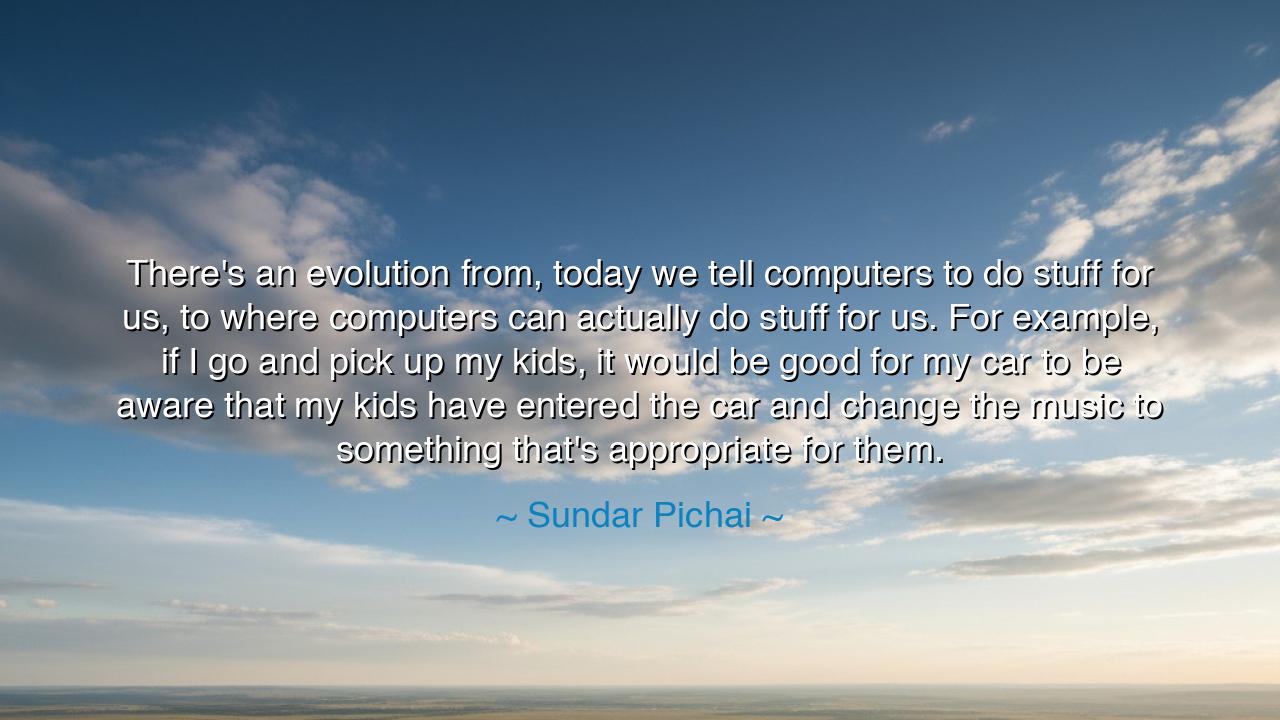
There's an evolution from, today we tell computers to do stuff
There's an evolution from, today we tell computers to do stuff for us, to where computers can actually do stuff for us. For example, if I go and pick up my kids, it would be good for my car to be aware that my kids have entered the car and change the music to something that's appropriate for them.






In the words of Sundar Pichai, “There's an evolution from, today we tell computers to do stuff for us, to where computers can actually do stuff for us. For example, if I go and pick up my kids, it would be good for my car to be aware that my kids have entered the car and change the music to something that's appropriate for them.” This vision of the future, one where machines anticipate and act in our best interest, speaks to a profound transformation in the relationship between humans and technology. It hints at an era in which intelligence is not only present in the minds of humans but is embedded in the very tools we use to navigate our lives.
In the ancient world, wisdom and learning were not seen merely as a process of accumulating facts, but as a means of growing in harmony with the natural world. The great philosophers such as Plato and Aristotle believed that knowledge should serve the greater good, helping humanity live in balance with the universe. Pichai’s reflection on the evolution of computers from mere tools of command to entities that anticipate and act on our behalf echoes this ancient vision of wisdom as a living force. Just as the ancients dreamed of a world where understanding and purpose could guide human action, so too do we now dream of a future where machines, guided by intelligence, assist us in ways that enhance our daily lives.
This shift from a world where we command machines to one where they serve us intuitively brings to mind the great strides made by Daedalus, the ancient craftsman and inventor of Greek mythology. Known for his ingenuity, Daedalus created machines and tools that could move on their own, echoing the early dreams of automation. The ability of his creations to act according to purpose rather than simple commands was seen as a marvel—a glimpse into a future where tools and humans could operate in a symbiotic relationship. Pichai’s words are not unlike the fabled aspirations of Daedalus: to craft not merely objects that obey, but those that understand.
In another historical context, consider the legendary Leonardo da Vinci, whose visionary mind conceived of machines long before their time. Da Vinci imagined flying machines and mechanical devices that seemed impossibly advanced for his era. He saw technology not as a servant to be commanded, but as a partner in the quest for greater understanding and achievement. Pichai’s vision is an extension of this idea: computers, and indeed all technology, should evolve to not only respond to commands but to engage with us in meaningful ways, anticipating our needs, much like a trusted ally.
The practical wisdom in Pichai’s quote reminds us of the importance of progress—a progression from tools that merely react to ones that interact. The very idea of a car knowing the appropriate music to play when your children enter it is more than a convenience; it is a manifestation of intelligence and empathy within the tools that serve us. It’s a glimpse of a world where artificial intelligence does not merely follow commands, but understands context, and in doing so, improves our daily lives. Such a world, while still a vision, represents the very evolution of technology: from static to dynamic, from passive to active, from servant to partner.
We are reminded of the teachings of Confucius, who believed that true wisdom comes not just from knowledge, but from understanding how to apply it to better serve humanity. In this sense, the future of technology is a natural extension of this philosophy—machines that do not simply execute tasks, but understand the greater context of our lives and the world we inhabit. In this way, machines would not replace human judgment, but amplify it, making us more effective in our roles as caregivers, creators, and innovators.
The lesson here is profound and clear: progress is not simply about creating tools that do more for us, but about creating tools that understand us—tools that anticipate, interact, and evolve alongside us. This vision of the future challenges us not just to create smarter machines, but to rethink the very nature of the relationship between humanity and technology. As we move forward, we must remain mindful of the wisdom embedded in our tools, ensuring that they evolve in ways that enhance not only our productivity but also our well-being.
Therefore, let us embrace the evolution of technology as partners in our journey, not merely as servants to our commands. We should foster an understanding of technology that seeks to enrich our lives, anticipating our needs, and responding not just with precision but with understanding and empathy. In doing so, we will create a future where intelligence, both human and artificial, works together to improve the world we live in. Just as the ancient philosophers dreamed of harmony between man and nature, so too should we strive for harmony between man and machine.






AAdministratorAdministrator
Welcome, honored guests. Please leave a comment, we will respond soon